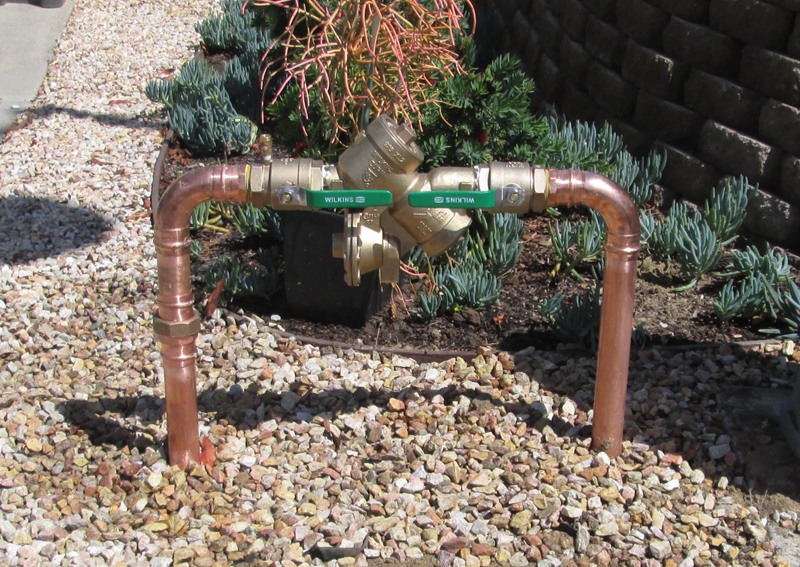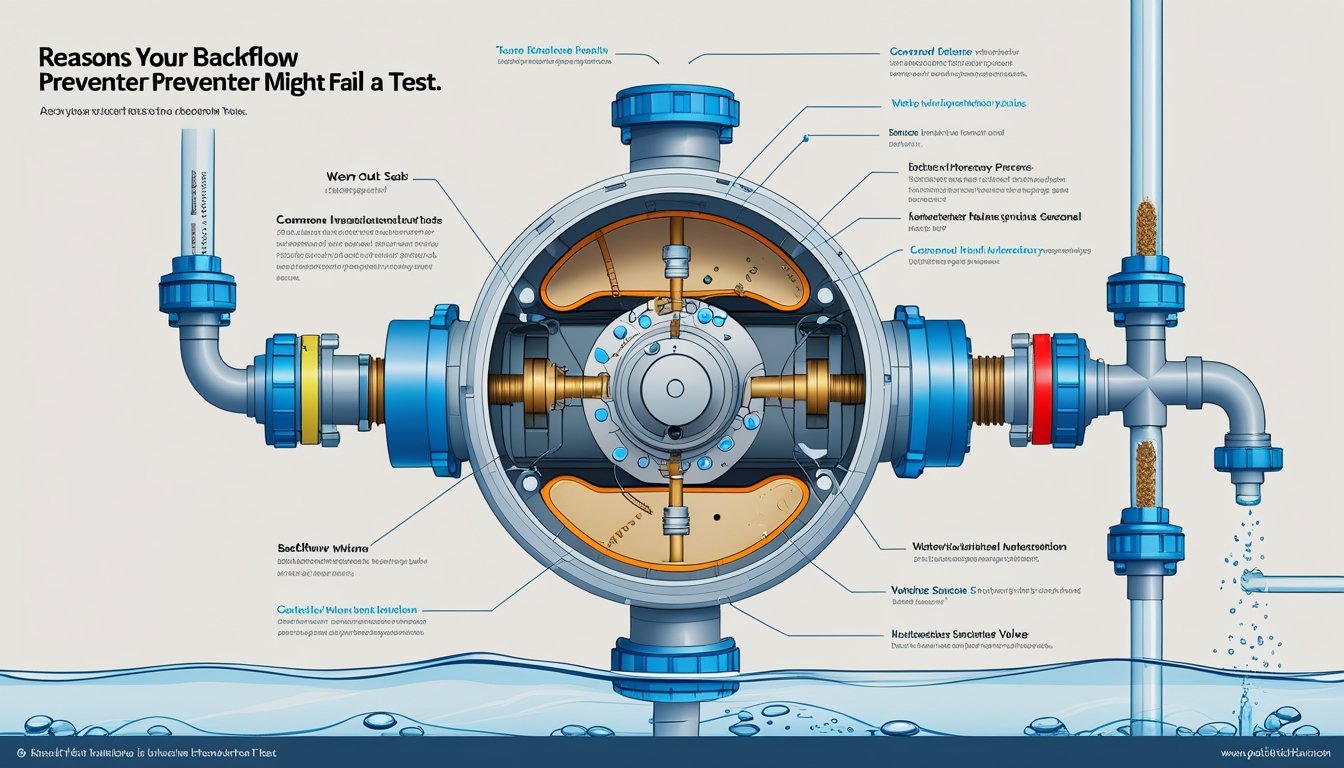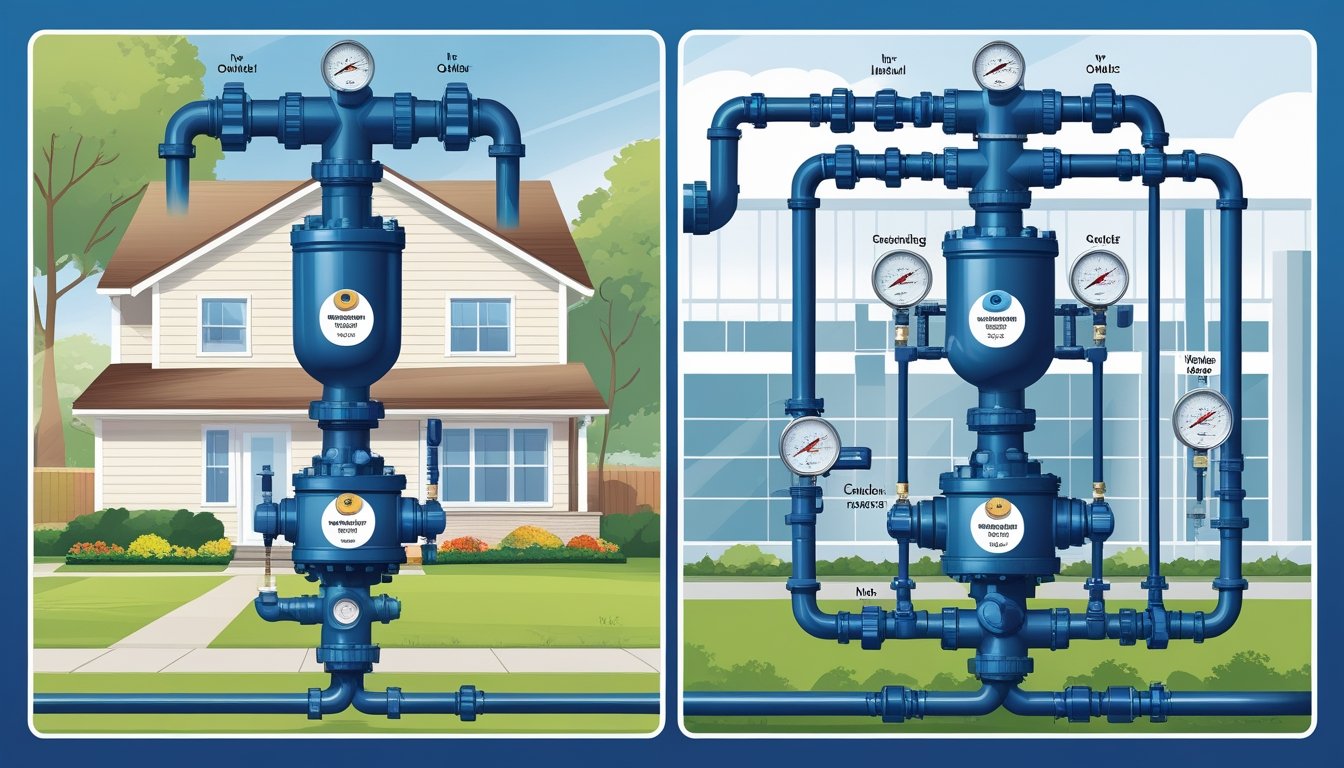Replacing your water filter is crucial for ensuring clean and safe drinking water. It's recommended to replace most water filters every three to six months, depending on the type and usage. Ignoring this can lead to reduced water quality and potential contaminants affecting your health.
Different types of filters have varying lifespans. For instance, pitcher filters typically need changing every two months, while carbon filters may last up to a year. Regularly monitoring your filter’s performance and adhering to replacement schedules can help maintain effective filtration.
At Pacific Backflow, we understand the importance of water safety in your home and community. By ensuring your water filter is replaced timely, you contribute to better health outcomes for yourself and those around you.
Understanding Water Filter Lifespan
Proper knowledge of water filter longevity helps you maintain safe drinking water quality. Different types of filters have varying durability, and various factors can influence how long they last. It's essential to follow manufacturer guidelines to ensure optimal performance and safety.
Types of Water Filters and Their Durability
Different types of water filters have distinct lifespans. For instance, carbon filters typically need replacement every 6 to 12 months. They are commonly used in pitchers and refrigerator systems. On the other hand, sediment filters usually last about 3 to 9 months, depending on water quality and household usage.
Reverse osmosis systems tend to have more durable cartridges that can last several years but need occasional maintenance. Each filter type plays a unique role, so understanding their durability can aid in scheduling replacements effectively.
Factors Affecting Water Filter Longevity
The longevity of your water filter can be influenced by several factors. Water quality is a primary aspect; more impurities will clog filters faster. High sediment content can rapidly reduce performance, especially in sediment filters.
Usage frequency plays a role too; filters in a family home's daily use will need more frequent replacements compared to those in a less active environment. Additionally, temperature and humidity can impact filter performance and lifespan. Keeping your system clean and monitored helps maximize its longevity.
Manufacturer Guidelines on Filter Replacement
Following manufacturer guidelines is essential for maintaining your water filter's effectiveness. Each type of filter will come with specific recommendations regarding replacement intervals. For example, many water filter cartridges have a defined lifespan in terms of gallons filtered or months of use.
Always check the instructions provided with your filter system for precise replacement schedules. If you're unclear about your system's needs, consult a professional, like those at Pacific Backflow, who can provide expert guidance. This adherence ensures that you consistently enjoy safe and clean water.
Indicators That It’s Time to Replace Your Water Filter
Being attentive to certain signs can help ensure optimal water quality and safety. Recognizing when to replace your water filter is crucial for maintaining clean, safe drinking water. Here are key indicators that indicate it’s time for a replacement.
Decreased Water Flow or Pressure
A noticeable drop in water flow or pressure is one of the first signs that your water filter may need replacement. If you observe that it takes longer to fill a glass or the water pressure feels significantly lower, this could indicate that the filter is clogged with contaminants.
Clogging occurs as the filter traps particles, which can lead to reduced efficiency. To avoid any inconvenience, consider checking the manufacturer's recommendations for filter replacement intervals. Regular maintenance can help keep your drinking water at the desired quality.
Changes in Water Taste, Smell, or Appearance
You should be vigilant for any changes in the taste, smell, or appearance of your drinking water. If your water starts to taste unusual, has an off-putting odor, or appears cloudy, it's a strong indication that the filter is failing to remove contaminants effectively.
These changes may signal that the filter is either past its prime or may be harboring harmful microorganisms. Always ensure that your drinking water meets health standards; if issues persist, it is wise to replace the filter promptly.
Visible Build-Up or Damage on the Filter
Inspecting your water filter regularly for any visible build-up or damage is essential. If you notice any discoloration or scaling on the filter, this could indicate that it is unable to function properly.
Physical damage, such as cracks or tears, can also compromise the filter's ability to purify your water effectively. Both conditions suggest that the filter should be replaced as soon as possible to maintain optimal water quality.
By paying attention to these indicators, you can ensure that your water filter operates effectively, protecting you and your family from contaminants. For reliable services related to water safety, remember that Pacific Backflow is here to help with your backflow prevention needs.
The Impact of Timely Filter Replacement
Replacing your water filter on time is crucial for ensuring high water quality and improving system performance. Regular maintenance of your filtration system not only enhances your hydration experience but also protects your health.
Protecting Water Quality and Health
Timely filter replacement is essential for maintaining water quality. Filters trap contaminants like bacteria, sediments, and chlorine, preventing them from entering your drinking water. Over time, these filters can become saturated and less effective.
Failing to replace a filter when necessary can lead to the growth of harmful microorganisms. These impurities can compromise your hydration efforts, leading to potential health risks. By changing your filter according to the manufacturer’s recommendations, you ensure that your water remains clean and safe for consumption.
In addition, regular replacement can help mitigate bad tastes and odors. Clean filtered water enhances your daily hydration, making it more likely that you will drink the recommended amount for optimal health.
Maintaining Proper System Performance
Regular filter changes contribute significantly to the performance of your water filtration system. A clogged or worn-out filter can reduce water flow and pressure, making it less efficient. This can ultimately affect how well your water dispenser operates.
For example, if you use your filtration system heavily, such as in a household with multiple users, frequent replacements are necessary. Not addressing this maintenance task can lead to system malfunctions, resulting in costly repairs.
Pacific Backflow emphasizes the importance of both timely filter replacements and backflow testing to ensure that your water supply remains safe. This dual approach enhances your overall water system performance and reliability. Keeping your filter fresh is a simple yet effective way to maintain quality and efficiency.
How to Replace Your Water Filter Correctly
Replacing your water filter is crucial for maintaining clean and safe drinking water. Following the right steps ensures the filter operates effectively and lasts longer. Here’s how to replace your water filter correctly.
Step-by-Step Filter Replacement Process
Start by gathering the necessary tools: a new filter cartridge, a bucket or towels, and optionally, gloves. First, turn off the water supply to your filtration system or water pump. This prevents any spills or leaks. Next, remove the old filter by unscrewing the housing or pulling it out, depending on the type.
Once removed, check for any debris or sediment inside the housing and clean it if necessary. Insert the new water filter cartridge, ensuring it fits snugly. Screw the housing back together or push the filter in securely. After that, turn the water supply back on and check for leaks. Run the water for a few minutes to flush out any carbon fines before using it.
Selecting the Right Filter Cartridge
Choosing the right replacement filter is essential for optimal performance. Look for filters that are compatible with your system's make and model. Check manufacturer specifications for the recommended cartridge type. If you're uncertain, consult resources or professionals for guidance.
Consider factors like the filter’s lifespan, which can range from 2 to 12 months depending on usage. For improved filtration, opt for multi-stage filters that remove a wider range of contaminants. We recommend sourcing your filters from trusted providers, like Pacific Backflow, to ensure quality and reliability.
Post-Replacement Maintenance Tips
After replacing your filter, it’s critical to perform basic maintenance to extend its lifespan. Regularly check for leaks and secure fittings to avoid any potential issues. Schedule periodic checks on your entire filtration system, including the water pump, to ensure it operates effectively.
Keep a log of replacement dates to stay aware of when your next change is due. Clean the filtration system as recommended by the manufacturer or consult professional services for maintenance assistance. Preventive care will enhance the performance of your water system and ensure your drinking water remains pure and safe.
Extending the Lifespan of Your Water Filtration System
Maintaining your water filtration system’s efficiency is crucial for ensuring clean water and prolonging its lifespan. Regular maintenance and monitoring of your water conditions will help you avoid premature replacements and costly repairs. Here are effective strategies to keep your system in optimal working condition.
Regular Maintenance and Inspections
To extend the life of your water filtration system, make maintenance a priority. Inspecting your system regularly allows you to identify potential issues early.
- Pre-Filters and Sediment Filters: These components should be checked and replaced according to the manufacturer's recommendation, typically every 3 to 6 months. Keeping these filters clean prevents larger particles from reaching the main filter.
- General Maintenance: Periodically examine the entire system for leaks, clogs, or unusual sounds. Ensure all connections are tight, and consider scheduling professional maintenance through services like Pacific Backflow, which specializes in backflow testing and system health.
- Cleaning: Some filters can be cleaned, but if you notice significant buildup, it is wiser to replace them. This ensures your water remains uncontaminated.
Monitoring Usage and Water Conditions
Understanding your water usage and conditions is vital in determining when to replace filters.
- Usage Patterns: If your household water consumption increases, your filters may need more frequent replacement. Tracking daily usage helps predict when maintenance is necessary.
- Water Quality: Be aware of changes in water taste, odor, or clarity. These signs indicate that your filters may be reaching their capacity.
- Testing Water Supply: Regularly test your water for contaminants. High levels of sediments, chlorine, or other impurities indicate it's time to change the filters. Tailoring your maintenance schedule based on your water quality can significantly prolong your filtration system's lifespan.
Frequently Asked Questions
Understanding when to replace your water filter can help maintain optimal performance and ensure clean water. Here are some specific questions and answers regarding water filter longevity and maintenance.
How often should a water filter in a refrigerator be replaced for optimal performance?
Refrigerator water filters typically need replacement every six months. This timeframe can vary based on your water quality and usage. Regularly checking your filter status is a good practice.
What indicators suggest it is time to change a Brita water filter?
For a Brita filter, change it when the water flow decreases or if you notice an off taste or smell. Brita recommends replacement every two months for optimal performance based on average usage.
What is the typical lifespan of a water filter in a Whirlpool refrigerator?
Whirlpool refrigerator water filters usually last about six months. Always refer to the manufacturer's instructions for specific guidance related to your model to ensure you replace the filter at the right time.
How can you determine if a water filter in a fridge is no longer effective?
Signs that your fridge water filter may no longer be effective include odd tastes, odors in the water, or a decrease in water pressure. If you experience any of these issues, it's advisable to replace the filter.
Is it necessary to replace fridge water filters every six months, or does it vary by usage?
While the standard recommendation is to replace fridge water filters every six months, usage and water quality can impact that timeline. If you notice any changes in taste or clarity, consider replacing the filter sooner.
What steps can I take to identify if my water filter jug needs to be changed?
To check if your water filter jug needs changing, monitor for changes in taste, odor, or water clarity. Additionally, follow the manufacturer's guidelines, which may recommend replacements based on time or number of gallons filtered.











